- Home
- Edward Cline
Revolution
Revolution Read online
SPARROWHAWK
Book Five
REVOLUTION
A novel by
EDWARD CLINE
ebook ISBN: 978-1-59692-947-0
M P Publishing Limited
12 Strathallan Crescent
Douglas
Isle of Man
IM2 4NR
via United Kingdom
Telephone: +44 (0)1624 618672
email: [email protected]
Originally published by:
MacAdam/Cage
155 Sansome Street, Suite 550
San Francisco, CA 94104
www.macadamcage.com
Copyright © 2005 by Edward Cline
ALL RIGHTS RESERVED.
Library of Congress Cataloging-in-Publication Data
Cline, Edward.
Sparrowhawk. Book V, Revolution / by Edward Cline.
p. cm. — (Sparrowhawk series ; bk. 5)
ISBN 1-59692-154-4 (alk. paper)
1. United States—History—Colonial period, ca. 1600–1775—Fiction.
2. United States—History—Revolution, 1775–1783—Fiction.
I. Title: Revolution. II. Title.
PS3553.L544S6273 2005
813’.54—dc22
Book and jacket design by Dorothy Carico Smith
Cover painting: The Evacuation of Charleston, from “The Story of the Revolution” by Henry Cabot Lodge (1850-1924), published in Scribner’s Magazine, September 1898 (oil on canvas) by Pyle, Howard (1853-1911)
Publisher’s Note: This is a work of fiction. Names, characters, places, and incidents either are the product of the author’s imagination or are used fictitiously. Any resemblance to actual events, locales, or persons, living or dead, is entirely coincidental.
“To hold an unchanging youth is to reach, at the end, the vision with
which one started.”
Ayn Rand, in Atlas Shrugged (1957)
CONTENTS
Chapter 1: The Pens
Chapter 2: The Paladin
Chapter 3: The Informer
Chapter 4: The Duel
Chapter 5: The Gazette
Chapter 6: The Taverns
Chapter 7: The “Madness”
Chapter 8: The Justices
Chapter 9: The Lacuna
Chapter 10: The Lieutenant
Chapter 11: The Victory
Chapter 12: The Assessment
Chapter 13: The Visit
Chapter 14: The Reunion
Chapter 15: The Amazons
Chapter 16: The Lieutenant-Governor
Chapter 17: The Concert
Chapter 18: The Clarion
Chapter 19: The Strategists
Chapter 20: The Session
Chapter 21: The Keystone
Chapter 22: The Rivals
Chapter 23: The Summons
Chapter 24: The Questions
Chapter 25: The Repeal
Chapter 26: The Victory
Chapter 1: The Pens
In June of 1765, what became known as the Virginia Resolves were first published in Rhode Island, in the Newport Gazette, all but the third Resolve, whose curious omission went unnoticed by anyone reading them for the first time. Subsequently, the seven Resolves — often only the first five — were reprinted in virtually every colonial newspaper.
The Virginia Gazette was not one of them. Its editor, an ardent Tory, refused to publish them, either from repugnance or at the behest of Lieutenant-Governor Francis Fauquier. Unless they procured copies of other colonial newspapers, Virginians gained knowledge of the Resolves and details of the dramatic session that produced them from letters, in taverns and coffeehouses, at weddings and balls, from merchants and tradesmen. Governor Francis Bernard of Massachusetts pronounced the Resolves an “alarm bell to the disaffected.” Commander-in-Chief General Thomas Gage in New York wrote to George the Third that the Resolves “gave the signal for a general outcry over the continent.”
The Resolves became the subject of earnest conversation among merchants, planters, farmers, and artisans, and a topic of heated debate in various colonial legislatures. These men were already fearful, sullen, and disaffected. The Resolves spurred their hopes that the Stamp Act could be successfully resisted, and caused them to adopt their own resolutions to defy and openly criticize Parliament. The Resolves acted as a linchpin that set their minds free to work; they were an example that certain words and actions were possible and necessary.
Throughout the colonies, even before the Resolves were broadcast, pens and tongues were busy assailing the Stamp Act. In Annapolis, Daniel Dulany, a lawyer and a member of the Maryland Assembly, was taking notes for a vigorous reply to two pamphlets whose arguments he took grave exception to. One, written by Soame Jenyns of the Board of Trade and a member for Cambridge Borough, lightly dismissed the principle of consensual taxation by representation. The second, written, suspected Dulany, by Thomas Whateley, secretary to George Grenville and a member for Ludgershall, implicitly upheld the opposite view, contending that, like nine-tenths of other Englishmen, the colonies were “virtually represented” in Parliament, and therefore subject to Parliament’s authority in all matters, especially taxation. Dulany argued that the notion of virtual representation was as covinous in England, and for more Englishmen, as it was in the colonies and for all colonials.
In Boston, another lawyer, John Adams, was taking notes for a “Dissertation” on the origins of and obstacles to English liberty, and in time devoted some pages of his paper to a learned reminder to his fellow citizens that ignorance of the history of liberty was as great a danger to them as tyranny itself. “Liberty cannot be preserved without a general knowledge among the people.” A second cousin, Samuel Adams, Harvard graduate, brewer, man of action, and member of the Massachusetts Assembly, was busy writing pamphlets that assailed the Stamp Act. Josiah Quincy, Jr., a lawyer and recent Harvard graduate, was penning anonymous letters to the Boston Gazette that questioned the legality of the Stamp Act and other Parliamentary legislation. Still another Bostonian, Jonathan Mayhew, a popular dissenting minister already renowned for his opposition to an Anglican episcopate in the colonies, preached to his congregation that no distinction should be made between an episcopate and the stamps, both being infringements on English liberty. These and numerous other correspondents, writers, and pamphleteers all agreed on one thing: That the Stamp Act was a violation of the British Constitution, prima facie null and void, and could be defied and flouted with impunity.
True to their promises, two Virginia ministers, Reverends William Robinson and Albert Acland, wrote to their superior in England, Richard Terrick, Bishop of London, who was also a staunch supporter of Grenville. Robinson reported that Patrick Henry, who first spoke treason while arguing against the Parson’s Cause two years ago, “blazed out in a violent speech against the authority of Parliament,” that he had proposed “several outrageous resolves, some of which passed, and were again erased as soon as his back was turned,” and that the culprit had “gone quietly into the upper parts of the country to recommend himself to his constituents by spreading treason, and enforcing firm resolution against the authority of the British Parliament.”
Acland had not attended the session in Williamsburg, but learned much of what was said and done in its last three days from Reece Vishonn, who imparted his observations in casual and worried conversation after services on the Sunday following the General Assembly’s adjournment; and from Edgar Cullis, who related his version of the events over tea the following Monday in the manner of a confession. The burgess also provided his minister with a copy of the Resolves.
What Acland learned served to increase his resentment toward Hugh Kenrick and his enmity for Jack Frake. “Parties residing in my own parish,” he wrote to the Bisho
p, “are active in fomenting treasonous defiance of the Crown amongst the plain people here, and behave in the matter little better than pranksterish, gin-sodden university students. It is hoped by many dutiful subjects in my parish that such behavior be rewarded with a noose or two, or at the very least with an introduction to the lash. It is also my own firm hope that your lordship, upon receiving this intelligence, employs his not insignificant influence to persuade the ministry to quell such obstinate words and actions with forthright words and actions of their own, in order to exact universal deference to the Crown and its gloried authority. Your lordship has the ear of His Majesty, and the collective ear of the noble upper House, and I am confident that you will speak with grave concern to these parties about the alarming, rebellious developments in these His Majesty’s dominions.”
The “pranksterish” behavior to which Acland alluded (but did not describe to the Bishop of London) comprised a host of matters. The first was Reece Vishonn’s decision not to hold a ball at Enderly in honor of the king’s birthday. This was an annual occasion to which the pastor was usually invited to lead the planter’s guests in a prayer for and the first toast to their sovereign’s health. This year, so soon after the dissolution of the General Assembly in remarkably acrid circumstances, the master of Enderly did not expect many of his guests would care to celebrate. Acland had heard also that the same event, held at the Governor’s Palace in Williamsburg, was a dismal affair, attended by barely a dozen guests instead of the usual throngs. Acland knew that Hugh Kenrick had in the past attended that ball, but he was not certain whether his non-attendance this year was a consequence of ill will between the planter and Fauquier or disrespect on the part of the burgess. It did not matter to him which it was; there was the latter’s role in the passage of the Resolves, which Acland regarded as bordering on criminality. There was, too, the overall surly mood of the reverend’s parishioners. His recent sermon on the virtue of humility was met by the congregation with an almost tangible indifference, while the collection plate that Sunday returned to him nearly empty. Acland penned his letter to the Bishop with narrowed eyes and a wry grin; he derived more satisfaction from composing the missive than he ever had from drafting an exhortation.
Ironically, Reverend James Maury, the parson whose cause two years before won him an award of one penny, wrote in glowing terms of the rising colonial uproar sparked by the very same lawyer who had once referred to him and his colleagues of the cloth as “rapacious harpies.” Maury was among those who first heard accusations of treason flung at Henry in the Hanover courthouse, yet he said in a letter to a friend in London, after a long disputation on the evils of the Stamp Act, that the widespread defiance of Parliament authority would likely cause some notable men to “brand us with the odious name of rebels, and others may applaud us for that generous love of liberty which we inherit from our forefathers.”
In 1739, “Prime Minister” Robert Walpole, still smarting from the defeat of his excise tax proposals six years earlier, and casting about for ways and means to reduce the government’s debts, replied to a query about why he did not propose to tax the American colonies directly: “I have old England set against me; do you think I will have new England likewise?” His successors in office and in Parliament were not imbued with such practical wisdom. They were arrogant enough to be idealists; they wished to assert Parliamentary authority in all they surveyed.
Early in July, a coastal sloop called on Caxton. While the crew unloaded some of its ballast — French molasses and Portuguese salt smuggled past the customs and naval tenders at the mouth of the York River near the Bay, nearly a hundred sacks of the salt cleverly overlaid with sand — its wiry captain strode up the hill and onto Queen Anne Street. After stopping in Mr. Rittles’s store to purchase some tobacco, he walked up to the Courier’s office and dropped off a bundle of mail.
Among the letters he left with Wendel Barret was a brief note to Hugh Kenrick from Otis Talbot in Philadelphia: “Sir: I have dispatched, on your request, the several copies of the Resolves of your legislature to corresponding merchants of my acquaintance in various towns on the seaboard, with urgings appended by me to invite their printers to broadcast them to whoever they believe would be receptive and friendly to them.” Talbot also reported that the Massachusetts Assembly, “on the suggestion of James Otis, has posted a letter to all colonial legislatures inviting them to choose delegates to a congress in New York October next to discuss measures and actions concerning the Stamp Act. Surely, Virginia will oblige him in that regard, and you will be one of those delegates.” There were also letters for Reece Vishonn, Thomas Reisdale, Jack Frake, and Wendel Barret himself, all of them postage-paid, except for the penny charged by the sloop captain for having carried them. Barret paid the captain the pence, then sent one of his apprentices out with the letters to deliver them and collect the cost.
Hugh Kenrick was in the middle of the fields, sitting on a stool before an easel, sketching in red crayon a vista of the property, when Spears came out and handed him the single letter. Hugh opened it, then grinned and exclaimed to his valet, “Ah! The mischief has been done, Spears! The fuse has been lit!” But as Spears hiked back to the great house of Meum Hall, Hugh sat and brooded over the news of the colonial congress. He did not think it odd, though, that he had been kept in ignorance of the proposed congress. Peyton Randolph, John Robinson, George Wythe, and other powers in the House of Burgesses no doubt had knowledge of the circular letter, which would have been addressed to Speaker Robinson. Opposed as those men had been to the Resolves, they would not be keen on sending even informal observers to the congress. And, thought Hugh, informal they must be: The General Assembly would not convene again until October or November, after the congress in New York. Lieutenant-Governor Fauquier would not even need to prorogue the Assembly to prevent the burgesses from choosing official delegates. What unfortunate timing!
Later that afternoon, he rode over to Morland, and found Jack Frake, John Proudlocks, and about half of the plantation’s tenants busy with shovels and pick-axes in the construction of a ditch. Two weeks earlier, over supper at Meum Hall, Jack revealed his plan to dig a “canal” through his fields from Hove Stream.
“My fields table a few feet above the stream,” Jack had explained, “then level off about sixty yards from the great house. A conduit such as you devised would be impractical, because it would require some kind of pump to pressure the water up and over the rise. So, what I’ve decided on is a narrow canal or channel that will cut through the fields, one wide enough to accommodate a bucket, but no more than half a man’s stride. At the stream, where the ground is at least twice the height of my fields, I will build a sluice to let in the water and to stop it before it overflows the channel.” He showed Hugh a diagram of his plan. “This way, my people needn’t go so far for water, and this ought to eliminate the salt from the river I’ve had to water the fields with.”
“Excellent plan,” remarked Hugh then. He volunteered to donate a mound of flat stones his own tenants had removed over the years from Meum Hall’s fields. “You’ll need those to brace the walls of your ditch, and perhaps even to pave the bottom of it. How deep will you dig it?”
“About a foot and a half.”
Today, as he rode his mount through stands of tobacco and corn stalks under the hot July sun, Hugh saw that the canal was about half finished. Jack Frake saw him approach, and paused to drop his shovel and take a drink from a flask. Hugh walked his mount up to him and tipped his hat. Jack smiled up at him as he ran a bare wrist over his sweaty brow. “Nothing could bring you here today but news,” he said.
Hugh nodded. “Yes. I’ve had word that Mr. Talbot has relayed the Resolves.”
“I’ve had a note from Captain Ramshaw, who delivered his own bundle of them in New York. He reports that the merchants and gentry there regret they did not think of the Resolves first.” Jack picked up his shovel, then plunged it upright into the ground and rested his forearms over the handle. He a
sked, “What was that phrase your friend Jones wrote that Colonel Barré used in the Commons? ‘Sons of liberty’?”
“Yes,” replied Hugh. “‘Sons of liberty.’ Why do you ask?”
Jack’s mouth bent in a smile that was half mischievous, half serious. “It would be an interesting name for an organization.”
Hugh sat back in his saddle and gave it some thought. “Yes,” he said, “it would be an interesting name. But what would be the purpose of this organization?”
The smile disappeared from Jack’s mouth. “To oppose the landing of stamps here, in November, if the opportunity favors us.”
“I see,” said Hugh. After another moment, he asked, “By ‘oppose,’ do you imply that their landing should be physically prevented?”
Jack nodded. “I mean that, exactly. With arms, if necessary.”
Hugh raised his riding crop and scratched his forehead with the end of it. At length, he remarked, “This wants thought, Jack. And discussion. The Attic Society meets this Saturday at Mr. Safford’s place. Will you propose the creation of such an organization as a subject of discussion?”
“I will propose that the Society adopt that name.”
Hugh frowned. “The Society’s purpose would be altered.”
Jack shook his head. “Not necessarily,” he answered. “Our purpose would be consistent and extended, from talk of principles of liberty, to practicing them.”
Hugh’s eyebrows went up, and he sighed. “This, too, wants thought.” He glanced down at his friend. “I must consult my law books.” He tipped his hat again, reined his mount around, and rode out of the fields back to Meum Hall.
Jack watched his friend ride away, then turned to rejoin the line of men busy at the ditch.

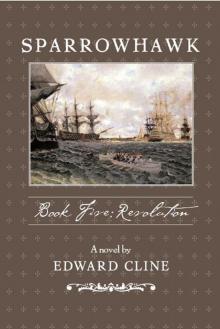 Revolution
Revolution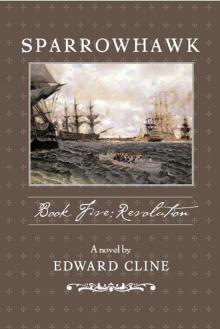 SH05_Revolution
SH05_Revolution War
War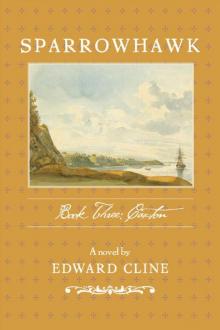 SH03_Sparrowhawk: Caxton
SH03_Sparrowhawk: Caxton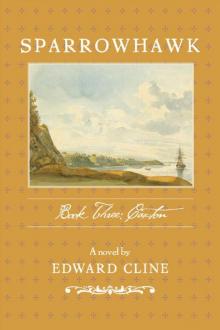 Sparrowhawk III
Sparrowhawk III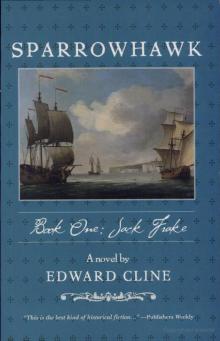 Jack Frake
Jack Frake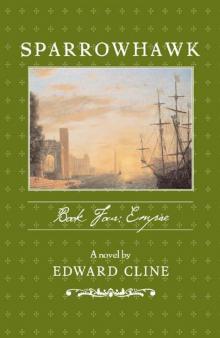 SH04_Empire
SH04_Empire Empire
Empire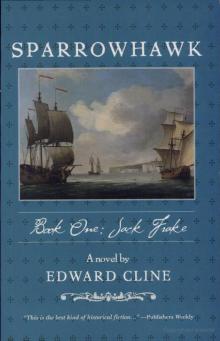 SH01_Jack Frake
SH01_Jack Frake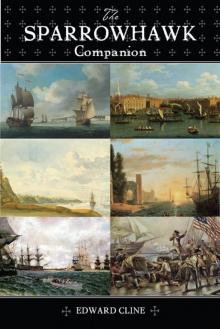 The Sparrowhawk Companion
The Sparrowhawk Companion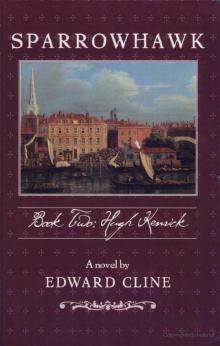 Hugh Kenrick
Hugh Kenrick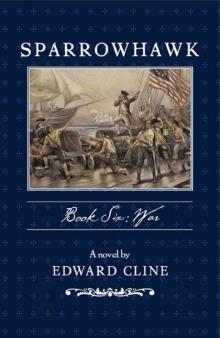 SH06_War
SH06_War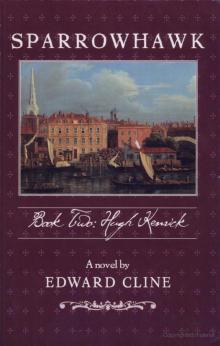 SH02_Hugh Kenrick
SH02_Hugh Kenrick